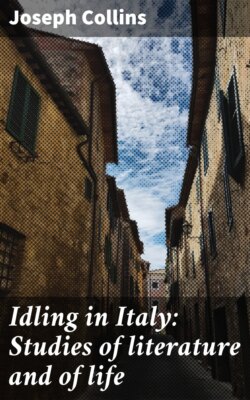Читать книгу Idling in Italy: Studies of literature and of life - Joseph Collins - Страница 9
На сайте Литреса книга снята с продажи.
CHAPTER IV
THE FUTURIST SCHOOL OF ITALIAN WRITERS
ОглавлениеTable of Contents
The Italians are a people of great emotional complexity, displaying a strange mixture of idealism and realism. They are at present engaged in constructing an edifice which shall be the admiration of the world for all time, to wit, a third Italy. Naturally the designers, the architects, the builders and the prospective inhabitants hope that it will be more ideal, more commodious, more adapted to its purposes than its predecessors. To the sympathetic observer, however, they appear to limit themselves narrowly to old building material.
There is nothing which mirrors the individual and composite mind of a country so illuminatingly as its literature. The man craving for power prefers the allegiance of a country's song-writers to that of its lawgivers. That a tremendous change has taken place to-day, not only in the songs of Italy but in all her literature, must be admitted. This change has been in process for a generation and is going on with increasing rapidity.
Italian literature is now going through a phase quite as distinct as that which characterized the romanticism initiated by Manzoni and which ended with the advent of Carducci. It would be difficult to find a word which would adequately express the spirit of it—perhaps the most descriptive one is protest. The new writers protest against the social, political, and religious acceptances of the past fifty years. They object to the acceptance of alleged facts substantiated only by tradition; they refuse adherence to teachings, doctrines, modes of thought and expression merely because they are old; they reject dogma originating in self-constituted authority, no matter how long or by whom it has been sanctioned and privileged, no matter how securely rooted. They will have none of the conventionalism which is out of harmony with the present conditions of life and with the present yearning for liberty. They stand against the teaching that the flesh must be punished in order that the soul may be purified, as they do against all slavish stereotypy, moss-covered convention, and archaic laws.
They claim instead that the best of life is to be found in purposeful action; that life should be speeded up, and that every one should be encouraged to live fully for the advantage that may come to himself, to those to whom he is beholden, and to the world. They advocate the strenuous life and invite the new and unforeseen, while urging exploration of untrodden fields and especially determination of things called inaccessible and unrealizable. They advocate equal life for men and women, and seek to give to such words as "patriotism" and "idealism" a fuller significance, so that the former shall not mean the heroic idealization of commercial, industrial, and artistic solidarity of a people but a love of liberty and a knowledge, recognition, and appreciation of what other people and other countries are attempting and accomplishing; and that the latter may be applied to the affairs of life and not to the affairs of the imagination.
This movement, in Italy, was begun by a group of men who called themselves Futurists and, if that name can be dissociated from the connotation that is given to it when applied to art, I see no objection to it. It has been influenced by the French Symbolists of the preceding generation, Baudelaire, de Goncourt, Villiers de l'Isle-Adam, Mallarmé, Verlaine, Huysmans, Rimbaud, whose work so profoundly influenced the course of French literature. Like this school the self-styled futuristic writers of Italy revolt against rhetoric and against tradition. Therefore they reject equally the ardent classicism of Carducci and D'Annunzio's decadent blend of idealism and realism, the crass, slavish Gallicism of Brocchi, the Scandinavian genuflections of Bracco and the Shavian imitations of Pirandello. In protest against all these they seek the full liberty of the written word, as the evangel of socialism seeks the liberty of the individual. Not from other writers but from reality itself, or from the depths of their own imaginations, they have received a vision and this vision they demand the right to evoke in others, by what words or what images they will. The art of expression should be speeded up, abbreviated, and epitomized, while the love of profound essentials is cultivated. To borrow from England's singer of materialistic grandeur and promise, they
